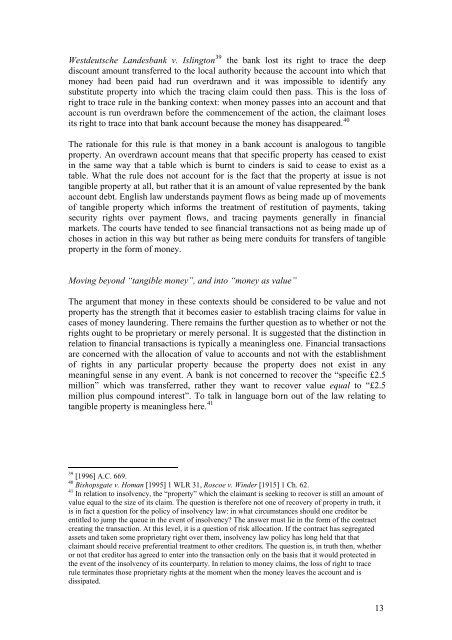The Unbearable Lightness of Property - alastairhudson.com
The Unbearable Lightness of Property - alastairhudson.com
The Unbearable Lightness of Property - alastairhudson.com
Create successful ePaper yourself
Turn your PDF publications into a flip-book with our unique Google optimized e-Paper software.
Westdeutsche Landesbank v. Islington 39 the bank lost its right to trace the deep<br />
discount amount transferred to the local authority because the account into which that<br />
money had been paid had run overdrawn and it was impossible to identify any<br />
substitute property into which the tracing claim could then pass. This is the loss <strong>of</strong><br />
right to trace rule in the banking context: when money passes into an account and that<br />
account is run overdrawn before the <strong>com</strong>mencement <strong>of</strong> the action, the claimant loses<br />
its right to trace into that bank account because the money has disappeared. 40<br />
<strong>The</strong> rationale for this rule is that money in a bank account is analogous to tangible<br />
property. An overdrawn account means that that specific property has ceased to exist<br />
in the same way that a table which is burnt to cinders is said to cease to exist as a<br />
table. What the rule does not account for is the fact that the property at issue is not<br />
tangible property at all, but rather that it is an amount <strong>of</strong> value represented by the bank<br />
account debt. English law understands payment flows as being made up <strong>of</strong> movements<br />
<strong>of</strong> tangible property which informs the treatment <strong>of</strong> restitution <strong>of</strong> payments, taking<br />
security rights over payment flows, and tracing payments generally in financial<br />
markets. <strong>The</strong> courts have tended to see financial transactions not as being made up <strong>of</strong><br />
choses in action in this way but rather as being mere conduits for transfers <strong>of</strong> tangible<br />
property in the form <strong>of</strong> money.<br />
Moving beyond “tangible money”, and into “money as value”<br />
<strong>The</strong> argument that money in these contexts should be considered to be value and not<br />
property has the strength that it be<strong>com</strong>es easier to establish tracing claims for value in<br />
cases <strong>of</strong> money laundering. <strong>The</strong>re remains the further question as to whether or not the<br />
rights ought to be proprietary or merely personal. It is suggested that the distinction in<br />
relation to financial transactions is typically a meaningless one. Financial transactions<br />
are concerned with the allocation <strong>of</strong> value to accounts and not with the establishment<br />
<strong>of</strong> rights in any particular property because the property does not exist in any<br />
meaningful sense in any event. A bank is not concerned to recover the “specific £2.5<br />
million” which was transferred, rather they want to recover value equal to “£2.5<br />
million plus <strong>com</strong>pound interest”. To talk in language born out <strong>of</strong> the law relating to<br />
tangible property is meaningless here. 41<br />
39 [1996] A.C. 669.<br />
40 Bishopsgate v. Homan [1995] 1 WLR 31, Roscoe v. Winder [1915] 1 Ch. 62.<br />
41 In relation to insolvency, the “property” which the claimant is seeking to recover is still an amount <strong>of</strong><br />
value equal to the size <strong>of</strong> its claim. <strong>The</strong> question is therefore not one <strong>of</strong> recovery <strong>of</strong> property in truth, it<br />
is in fact a question for the policy <strong>of</strong> insolvency law: in what circumstances should one creditor be<br />
entitled to jump the queue in the event <strong>of</strong> insolvency <strong>The</strong> answer must lie in the form <strong>of</strong> the contract<br />
creating the transaction. At this level, it is a question <strong>of</strong> risk allocation. If the contract has segregated<br />
assets and taken some proprietary right over them, insolvency law policy has long held that that<br />
claimant should receive preferential treatment to other creditors. <strong>The</strong> question is, in truth then, whether<br />
or not that creditor has agreed to enter into the transaction only on the basis that it would protected in<br />
the event <strong>of</strong> the insolvency <strong>of</strong> its counterparty. In relation to money claims, the loss <strong>of</strong> right to trace<br />
rule terminates those proprietary rights at the moment when the money leaves the account and is<br />
dissipated.<br />
13













